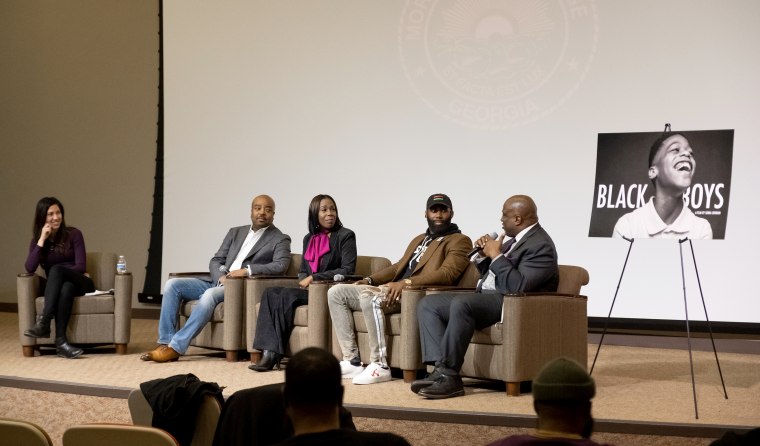The cases of Seven Bridges, 10, of Louisville, Kentucky; Rylan Hagan, 11, and Stormiyah Denson-Jackson, 12, both from Washington, D.C.; and McKenzie Adams, 9, of Linden, Alabama, are indicative of a rising epidemic occurring among young black people.
The four were all said to be overachievers who did their chores and excelled in studies. But they also have another thing in common: They were all victims of alleged taunting and bullying at school, and they all hanged themselves.
“There’s a sense of hopelessness that we perpetually experience,” said Dr. Michael Lindsey, executive director of the McSilver Institute for Poverty Policy and Research at the New York University Silver School of Social Work.
“We feel that things aren’t going to get better. It almost feels like we don’t have time to be depressed about it. These situations continue to happen,” he said at a recent panel discussing black boys and mental health at his alma mater, the all-male historically black university Morehouse College.
The Centers for Disease Control and Prevention found in a November report that suicide is the second-leading cause of death for ages 10 to 34. In another study published by the academic journal JAMA Pediatrics three years earlier, suicide in the United States doubled among black youth as opposed to whites, specifically ages 5 to 11. From 1993 to 2012, out of the 657 kids mentioned in the study who died by suicide, a significant increase in suicide rate occurred among black boys.
Lindsey, an expert on race and adolescent mental health, assembled a panel of athletes, community leaders, filmmakers and human rights activists to exchange personal anecdotes, share additional research findings, and offer possible solutions for ways black boys can share their strengths and weaknesses with no judgment, consequences or repercussions. One of the first steps toward improving the lives of black youth is to create safe spaces for people of color of all ages, backgrounds and disciplines to share experiences and talk openly about issues relating to mental health, Lindsey said.
He spent a great deal of time at the Morehouse town hall meeting examining how staffing in the primary school system often presents a major drawback for supporting black and brown boys. He mentions in one of his research studies that schools are among the largest providers of mental health services. Lindsey also concludes that more kids get mental health treatment in school than anywhere else.
Despite the optimism in Lindsey’s research, the Washington, D.C., native’s findings reveal that the lack of clinical availability in the school system is a disparity for African-American and Latino kids who live in low-income communities. “Every school should have a mental health provider,” Lindsey said. “The reality is in poor communities, kids either do not have a mental health provider in their schools or if there is a provider, that person is only there on Tuesday.”
That lack of clinical support, Lindsey told the panel, often results in young men experiencing high incidences of suspensions, expulsions, anxiety, depression and especially suicide. He said black boys often get treatment through emergency services. In a recent study, the number of black adolescents who visited the emergency room for mental health-related issues rose significantly, NBC News reported in November. “That is the first treatment into the mental health context for black kids,” Lindsey said. “Providers have to be proportionate to the number of kids in schools.”
Panelists said improving mental health awareness starts by taking matters into their own hands. Philadelphia Eagles safety Malcolm Jenkins, who co-founded the Players Coalition, a social justice advocacy group with other NFL players, thinks back to when he saw LeBron James and Dwyane Wade at an ESPY awards show proclaim they would use their platform to advocate for social justice.
That moment, Jenkins recalls, inspired him to seek therapy and work on articulating his feelings. He believes athletes and other public figures being more open about their personal struggles is a way to help alleviate stigmas around the black community addressing mental health.
“Talking through some of these things, you start to recognize the trauma more and more,” Jenkins said. “I hope we begin to break down our walls, separate our strengths, and separate what we go through where we can unpack the trauma that we deal with.”
“Athletes recognize how much leverage and power they have,” Jenkins said. “In football, you’re always taught to put the team before yourself. I have a ton of interests and talents outside of sports. I have intellect and a voice that’s needed at that point in time. If they could do it, then I could do it.”
Campaign for Black Male Achievement CEO Shawn Dove said collaboration is the best medicine for mental health.
“Educators and school administrators should not be solely responsible for the care of our children,” Dove said. “A generation ago, black professional football players could not possibly say they’re healing because of therapy. You couldn’t go to another man and say ‘I’m scared.’ It’s OK to ask for help. We shouldn’t undervalue the courage that it takes for men to say they’re in therapy because they don’t have their stuff together.”
If you or a loved one are looking for help, please call the National Suicide Prevention hotline at 1-800-273-8255.
